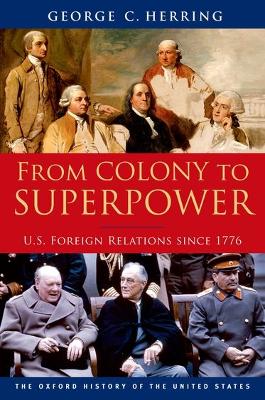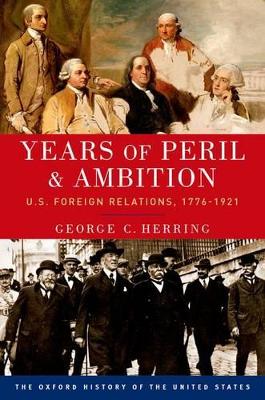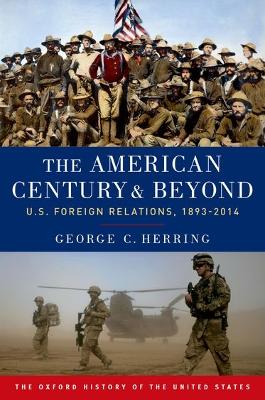Oxford History of the United States
3 total works
A finalist for the 2008 National Book Critics Circle Award for Nonfiction, this prize-winning and critically acclaimed history uses foreign relations as the lens through which to tell the story of America's dramatic rise from thirteen disparate colonies huddled along the Atlantic coast to the world's greatest superpower.
George C. Herring tells a story of stunning successes and sometimes tragic failures, captured in a fast-paced narrative that illuminates the central importance of foreign relations to the existence and survival of the nation, and highlights its ongoing impact on the lives of ordinary citizens. He shows how policymakers defined American interests broadly to include territorial expansion, access to growing markets, and the spread of an "American way" of life. And Herring does all this in a
story rich in human drama and filled with epic events. Statesmen such as Benjamin Franklin and Woodrow Wilson and Harry Truman and Dean Acheson played key roles in America's rise to world power. But America's expansion as a nation also owes much to the adventurers and explorers, the sea captains,
merchants and captains of industry, the missionaries and diplomats, who discovered or charted new lands, developed new avenues of commerce, and established and defended the nation's interests in foreign lands. From Colony to Superpower captures all this as it tells the dramatic story of America's emergence as superpower—its birth in revolution, its troubled present, and its uncertain future.
George C. Herring tells a story of stunning successes and sometimes tragic failures, captured in a fast-paced narrative that illuminates the central importance of foreign relations to the existence and survival of the nation, and highlights its ongoing impact on the lives of ordinary citizens. He shows how policymakers defined American interests broadly to include territorial expansion, access to growing markets, and the spread of an "American way" of life. And Herring does all this in a
story rich in human drama and filled with epic events. Statesmen such as Benjamin Franklin and Woodrow Wilson and Harry Truman and Dean Acheson played key roles in America's rise to world power. But America's expansion as a nation also owes much to the adventurers and explorers, the sea captains,
merchants and captains of industry, the missionaries and diplomats, who discovered or charted new lands, developed new avenues of commerce, and established and defended the nation's interests in foreign lands. From Colony to Superpower captures all this as it tells the dramatic story of America's emergence as superpower—its birth in revolution, its troubled present, and its uncertain future.
Praised in the New York Times Book Review for its "Herculean power of synthesis," George C. Herring's 2008 From Colony to Superpower has won wide acclaim from critics and readers alike. Years of Peril and Ambition: U.S. Foreign Relations, 1776-1921 is the first volume of a new split paperback edition of that masterwork, making this award-winning title accessible to those with a particular interest in the first half of the United States'
history.
This first volume of Herring's international narrative charts the rise of the United States from a loose grouping of British colonies huddled along the Atlantic coast of North America into an emerging world power at the end of World War I. It tells an epic story of restless settlers pushing against weak restraints; of explorers, sea captains, adventurers, merchants, and missionaries carrying American ways to new lands. It analyzes countless crises, some resulting in war and others resolved
peacefully. Above all, it is the tale of United States' expansion, commercial and political, across the North American continent, into the Caribbean and Pacific Ocean regions, and, economically, worldwide. Herring brings this first segment of America's dramatic emergence as a superpower to a close with
the United States' post-World War I rise to the status of the world's most powerful nation, poised-however unsteadily-for global engagement in what would be called the American Century.
Years of Peril and Ambition highlights the ongoing impact of the nation's international affairs on the household names of U.S. history but also on ordinary citizens. Featuring a grand cast of characters, encompassing statesmen and presidents, diplomats and foreigners, and rogues and rascals alike, this fast-paced account illuminates the central importance of foreign relations to the existence and survival of the nation.
history.
This first volume of Herring's international narrative charts the rise of the United States from a loose grouping of British colonies huddled along the Atlantic coast of North America into an emerging world power at the end of World War I. It tells an epic story of restless settlers pushing against weak restraints; of explorers, sea captains, adventurers, merchants, and missionaries carrying American ways to new lands. It analyzes countless crises, some resulting in war and others resolved
peacefully. Above all, it is the tale of United States' expansion, commercial and political, across the North American continent, into the Caribbean and Pacific Ocean regions, and, economically, worldwide. Herring brings this first segment of America's dramatic emergence as a superpower to a close with
the United States' post-World War I rise to the status of the world's most powerful nation, poised-however unsteadily-for global engagement in what would be called the American Century.
Years of Peril and Ambition highlights the ongoing impact of the nation's international affairs on the household names of U.S. history but also on ordinary citizens. Featuring a grand cast of characters, encompassing statesmen and presidents, diplomats and foreigners, and rogues and rascals alike, this fast-paced account illuminates the central importance of foreign relations to the existence and survival of the nation.
In his last years as president of the United States, an embattled George Washington yearned for a time when his nation would have "the strength of a Giant and there will be none who can make us afraid." At the turn of the twentieth century, the United States seemed poised to achieve a position of world power beyond what even Washington could have imagined.
In The American Century and Beyond: U.S. Foreign Relations, 1893-2014, the second volume of a new split paperback edition of the award-winning From Colony to Superpower, George C. Herring recounts the rise of the United States from the dawn of what came to be known as the American Century. This fast-paced narrative tells a story of stunning successes and tragic failures, illuminating the central importance of foreign relations to the existence and survival of the nation.
Herring shows how policymakers defined American interests broadly to include territorial expansion, access to growing markets, and the spread of the "American way of life." He recounts the United States' domination of the Caribbean and Pacific, its decisive involvement in two world wars, and the eventual victory in the
half-century Cold War that left it, after the collapse of the Soviet Union, the world's lone superpower.
But the unipolar moment turned out to be stunningly brief. Since the turn of the twenty-first century, conflicts in Afghanistan and Iraq and the emergence of nations such as Brazil, Russia, India, and China have left the United States in a position that is uncertain at best. A new chapter brings Herring's sweeping narrative up through the Global War on Terror to the present.
In The American Century and Beyond: U.S. Foreign Relations, 1893-2014, the second volume of a new split paperback edition of the award-winning From Colony to Superpower, George C. Herring recounts the rise of the United States from the dawn of what came to be known as the American Century. This fast-paced narrative tells a story of stunning successes and tragic failures, illuminating the central importance of foreign relations to the existence and survival of the nation.
Herring shows how policymakers defined American interests broadly to include territorial expansion, access to growing markets, and the spread of the "American way of life." He recounts the United States' domination of the Caribbean and Pacific, its decisive involvement in two world wars, and the eventual victory in the
half-century Cold War that left it, after the collapse of the Soviet Union, the world's lone superpower.
But the unipolar moment turned out to be stunningly brief. Since the turn of the twenty-first century, conflicts in Afghanistan and Iraq and the emergence of nations such as Brazil, Russia, India, and China have left the United States in a position that is uncertain at best. A new chapter brings Herring's sweeping narrative up through the Global War on Terror to the present.


